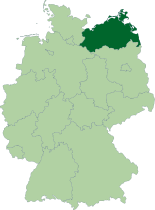Mecklenburg-Vorpommern
| Mecklenburg-Vorpommern | |||
|---|---|---|---|
| State of Germany | |||

|
|||
|
|||
 |
|||
| Coordinates: 53°37′N 12°42′E / 53.617°N 12.700°E | |||
| Country | Germany | ||
| Capital | Schwerin | ||
| Government | |||
| • Minister-President | Erwin Sellering (SPD) | ||
| • Governing parties | SPD / CDU | ||
| • Bundesrat votes | 3 (of 69) | ||
| Area | |||
| • City | 23,174 km2 (8,948 sq mi) | ||
| Population (2015-12-31) | |||
| • City | 1,612,362 | ||
| • Density | 70/km2 (180/sq mi) | ||
| Time zone | CET (UTC+1) | ||
| • Summer (DST) | CEST (UTC+2) | ||
| ISO 3166 code | DE-MV | ||
| Vehicle registration | formerly: MP (1945–1947), SM (1948–1953) | ||
| GDP/ Nominal | €40 / $45 billion (2015) | ||
| GDP per capita | €25,000 / $28,000 (2015) | ||
| NUTS Region | DE8 | ||
| Website | Mecklenburg-Vorpommern.eu | ||
Mecklenburg-Vorpommern ([ˈmeːklənbʊʁk ˈfoːɐ̯pɔmɐn]; far more often known as Mecklenburg-West Pomerania in English) (also shortened to Meck-Pomm) is a federated state in northern Germany. The capital city is Schwerin. The state was formed through the merger of the historic regions of Mecklenburg and Vorpommern after the Second World War, dissolved in 1952 and recreated at the time of the German reunification in 1990.
Mecklenburg-Vorpommern is the sixth largest German state by area, and the least densely populated. The coastline of the Baltic Sea, including islands such as Rügen and Usedom, as well as the Mecklenburg Lake District, features many holiday resorts and unspoilt nature, making Mecklenburg-Vorpommern one of Germany's leading tourist destinations. Three of Germany's fourteen national parks are in Mecklenburg-Vorpommern, in addition to several hundred nature conservation areas.
Major cities include , Schwerin, Neubrandenburg, Stralsund, Greifswald, Wismar and Güstrow. The (est. 1419) and the University of Greifswald (est. 1456) are among the oldest in Europe. Mecklenburg-Vorpommern was the site of the 33rd G8 summit in 2007.
...
Wikipedia


